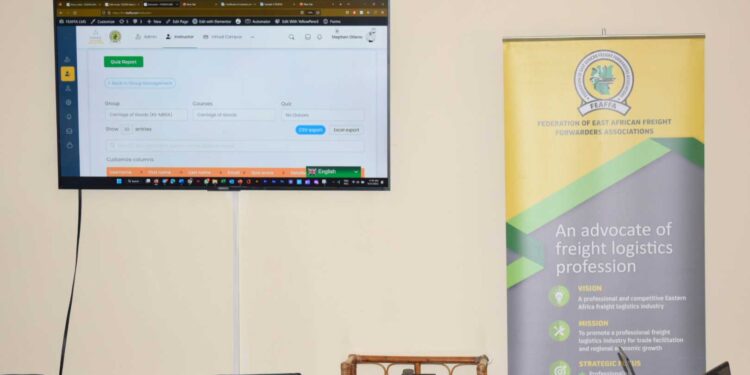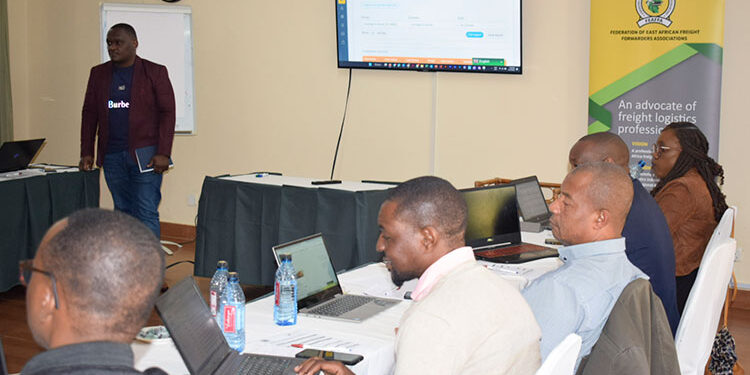The Federation of East African Freight Forwarders Associations (FEAFFA) is enhancing the FEAFFA Online Resource Centre (FORCE), an eLearning portal meant to provide flexibility and more accessibility.
The eLearning portal will also make it more affordable for customs agents and freight forwarders in East Africa to undertake the updated East Africa Customs and Freight Forwarding Practicing Certificate (EACFFPC) curriculum.
The development is being done in phases. The first phase focused on structuring the portal to accommodate the EACFFPC Programme. The ongoing phase is focusing on addressing the varying needs of the physical training Programme at the training schools of the revenue authorities in the East Africa Community (EAC).
It will also improve the interactivity of the content and explore the possibility of integrating it with other external learning portals of Customs Training schools for ease of access.
“A consultant was hired to work on the portal and has since started work. The eLearning portal is being enhanced to accommodate the updated curriculum for customs agents and freight forwarders in EAC. Uganda and Kenya are already customs agents and freight forwarders training under the new curriculum. Other countries will roll out the revised curriculum from next year,” Mr. Philippe Ndikumana, FEAFFA President told Freight Logistics.
The Federation has also developed a system for the management of the Continuous Professional Development (CPD) program. The CPD program is meant to keep the agents abreast with the constant changes within the supply chain. Three CPD workshops have been held in Rwanda with over 80 agents registered on the system in partnership with Rwanda Freight Forwarders Association (RWAFFA) and Rwanda Revenue Authority (RRA). The workshops among other things focus on addressing the emerging trends in the logistics sector including the revised EAC revised Common External Tariffs (CETs), the new Incoterms, technological changes at the customs, and new requirements when clearing cargo just to mention but a few.
The CPD system mainly supports the registration of practicing agents and the award of CPD points to the practitioners. The system also allows users to generate certificates of compliance which once passed into law, will form a part of the requirements for licensing by the customs departments. More CPD workshops are planned for in other countries, especially Uganda and Kenya.
FEAFFA relies on the technical expertise of the Curriculum Implementation Committee (CIC) through respective technical experts of partner institutions customs and national associations in the execution of training and capacity-building activities.

This week, FEAFFA held a two-day meeting that brought together the IT experts in the region to review the FEAFFA eLearning Portal and FEAFFA Integrated CPD Management system on the 21st and 22nd of November at Lukenya Gateway Resort in Kenya.
The meeting was meant to get the input of the experts for consideration in the development of the FEAFFA eLearning portal and CPD system. Of key interest is how the training schools of the revenue authorities can interface with these systems to complement the training needs for the Customs Agents and Freight Forwarders in the region.
The meeting was attended by participants mainly from the Revenue Authority Training schools, National Associations of customs clearing and forwarding agents, the FEAFFA secretariat, and the consultants. They include the IT professionals overseeing e-learning and trainers with experience in e-learning at the institutes.
FEAFFA intends to roll out the two systems next and contribute towards the realization of an efficient and integrated logistics supply chain by building the capacity of the logistics sector players.
TradeMark East Africa (TMEA) has remained a key development partner in supporting initiatives that facilitate trade in East Africa. By partnering with FEAFFA, the industry has benefited from the training activities that provide the requisite skills and knowledge to the Customs Agents and Freight forwarders. This has led to a significant reduction in errors committed by the agents thus leading to faster processing and clearance of cargo across borders.
This article was published by the editorial team at FEAFFA. For any enquiries, contact us via Email: freightlogistics@feaffa.com Tel: +254733780240





